Juncker Lost Support of His Own Group on Migration but Won Applause by the Rest
Adelina Marini, May 3, 2015
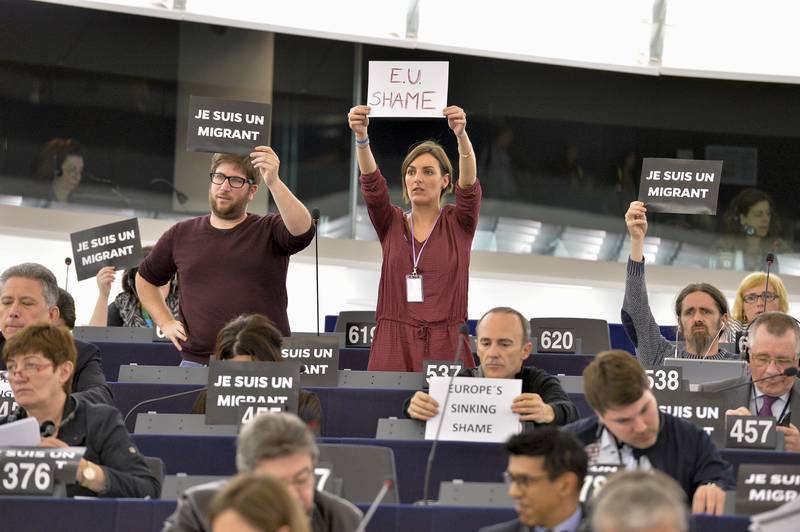 The left wing, the Liberals, the Greens and the European Commission stood up against the Council and the right wing in the European Parliament on the issue of migration during the debate on Wednesday (29 April) in the European Parliament, described by EU Migration Commissioner Dimitris Avramopoulos (Greece, EPP) as historical. For the first time in a long time the statements, at least of the leaders of political groups, were entirely on the substance, deprived of the usual empty phrases and remarks which are on the edge of hate speech. This shows that the debate is terribly late but still very necessary. The positions expressed have revealed a serious division in the EU on the issue how to tackle the refugee and migration flows. The tone of the indeed dramatic discussion was set by Jean-Claude Juncker, the European Commission president, who strongly criticised the Council for their position from 23 April and was strongly applauded by the members of the European Parliament.
The left wing, the Liberals, the Greens and the European Commission stood up against the Council and the right wing in the European Parliament on the issue of migration during the debate on Wednesday (29 April) in the European Parliament, described by EU Migration Commissioner Dimitris Avramopoulos (Greece, EPP) as historical. For the first time in a long time the statements, at least of the leaders of political groups, were entirely on the substance, deprived of the usual empty phrases and remarks which are on the edge of hate speech. This shows that the debate is terribly late but still very necessary. The positions expressed have revealed a serious division in the EU on the issue how to tackle the refugee and migration flows. The tone of the indeed dramatic discussion was set by Jean-Claude Juncker, the European Commission president, who strongly criticised the Council for their position from 23 April and was strongly applauded by the members of the European Parliament.
According to him, the extraordinary European Council two weeks ago was instantly convened but the leaders' response was inadequate. Mr Juncker welcomed the member states for approving his proposal to increase the budget of the Triton mission to 120 million euros as in this way it becomes equal to the Italian mission Mare Nostrum. He recalled, however, that Italy alone financed its mission. "In other words, that is a return to normality. It was anything but normal to leave the funding of Mare Nostrum to Italy alone", said the chief of the Commission and was vehemently applauded in the house in Strasbourg. He repeated what he said at the press conference after the end of the European Council on 23 April: "The conclusions adopted at the European Council are not as ambitious as they should have been".
Jean-Claude Juncker also said that he would work with Mr Avramopoulos on the establishment of a quota system for the fair geographical relocation of refugees throughout the EU. "We cannot leave relocation of refugees to the member states on the periphery", said the former prime minister of Luxembourg (EPP). For this statement he was again strongly applauded while many of the MEPs were holding placards saying in French and Italian: "I'm a migrant" following the analogy of Je Suis Charlie. The real debate in the European Parliament, however, began when Jean-Claude Juncker announced the EU should "leave the door partly ajar" for legal migration. "If we don't open the door to legal migration the unfortunate people of our world will be climbing in through our windows". According to him, the legal migration is part of the mid-term solution to the problem. Juncker also said that he was aware with the "fluctuations" of the public opinion. "I have been calling for legal migration. More people are now calling for legal migration. But I wonder would they still be calling for legal migration in a few months time 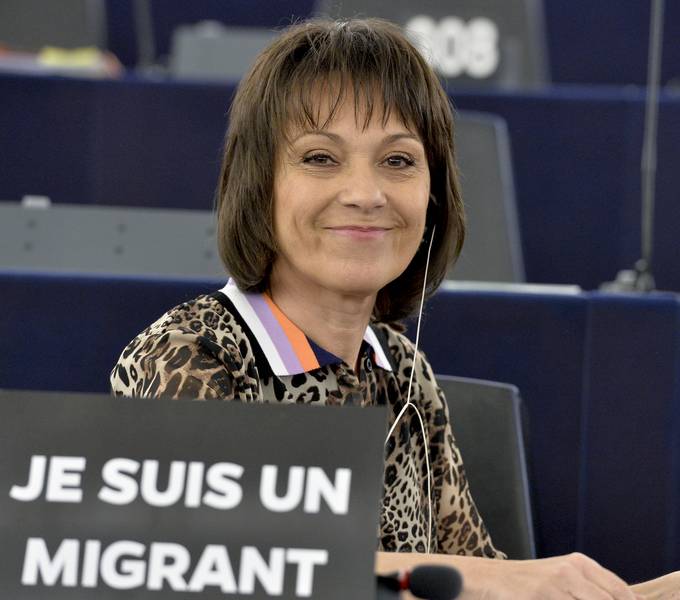 when the subject is less fashionable", the Commission chief added. He concluded with the words that the European continent could not be the only destination for the poor people of the world.
when the subject is less fashionable", the Commission chief added. He concluded with the words that the European continent could not be the only destination for the poor people of the world.
Unexpectedly, including for many MEPs, the biggest political group in the European Parliament, whose candidate for European Commission at the European election was precisely Jean-Claude Juncker, turned against him on the latter point. The leader of the group, Manfred Weber (Germany), said the EPP was strongly committed to the relocation of the refugees burden across Europe. At the moment only a handful of countries are taking this burden. That is why, the group is looking forward to the Commission proposal on this issue. In the same time, however, he said that the EU should be very careful in approaching the issue of asylum. Two thirds of the asylum-seekers do not fulfil the requirements and must be returned home, he said. Regarding the legal migration, however, Manfred Weber burst off. "But, colleagues, if you say that if you open up the door to legal migration, to our labour markets, this would put an end to all the misery and destitution around the Med region, I'm afraid you are wrong. We're talking about 500 000, maybe a million of Africans. Are we going to welcome all these people? Are we talking about quotas?".
It is one thing to talk about legal migration but it is completely different to talk about economic migration, Mr Weber added recalling that at the moment one in every five people in Europe is without a job. We need a debate, he said. "I'm not sure the solution to illegal migration is to have a massive legal migration", said the EPP group chief thus unleashing many retorts. This provoked Martin Schulz, the European Parliament president, to introduce a limit to the so called blue cards. In the very beginning of the debate he said he was flooded by "millions of blue cards". The first to get his blue card accepted was Hungarian MEP István Ujhelyi (Socialists & Democrats) who used the situation to say that Prime Minister Viktor Orban was setting money aside to fight European values. The name of the Hungarian premier was mentioned several times during the debate on the occasion of his intention to restore the death penalty.
The government in Budapest has recently opened a public consultation which will last from the beginning of May until 1 July about the threat migrants pose. According to the government, they represent a new type of a threat which needs to be prevented. Manfred Weber blamed the left wing for always trying to involve the others in purely national issues that have to be resolved by the member states themselves but Sophie in ' Veld from the Liberal group (The Netherlands) directly asked when would the EPP finally expel Viktor Orban. "Mr Orban as well is using this tragedy in the Mediterranean for his own populist purposes. And quite frankly, dear Mr Weber, dear Mr Brok, this is not about national politics. If anything that this is about is the European values that we stand for and I hope that the EPP will finally decide to expel Mr Orban", the Liberal deputy added. The Alliance of Liberals and Democrats for Europe (ALDE) has been for years raising the problem with Orban's authoritarian rule but often without much success.
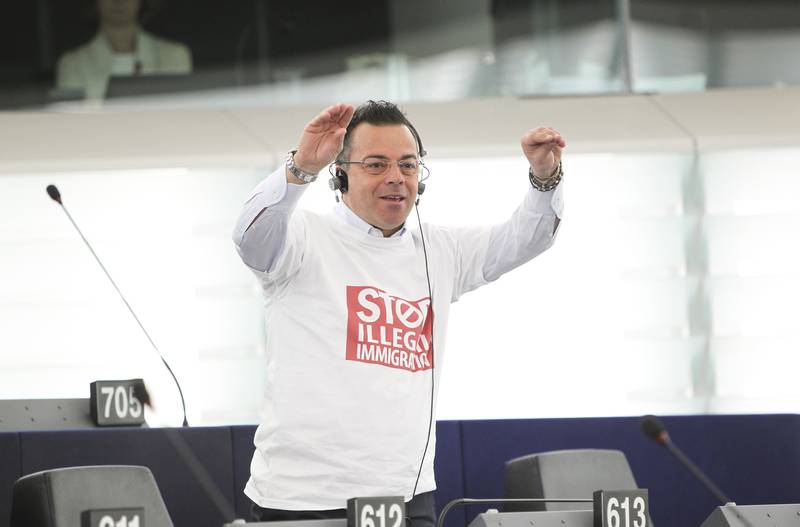 The entire right-wing spectre in the European Parliament was against the "opening of the door" for legal migration. The statement that provoked strong reactions of indignation was of the leader of the European Conservatives and Reformists group (ECR, Syed Kamall (UK), who started his speech with the words that his parents went to Britain to find a better life. "Had they not taken that leap, had they not left their homes, my life would be very different. When I see poverty or tragedies like this my heart wishes we were able to offer that opportunity to everyone. But my head tells me we cannot", said Syed Kamall. The search of new forms of legal migration will not resolve the problem with refugees and the huge number of asylum-seekers who do not meet the criteria. He, too, called against mixing legal migration with economic migration.
The entire right-wing spectre in the European Parliament was against the "opening of the door" for legal migration. The statement that provoked strong reactions of indignation was of the leader of the European Conservatives and Reformists group (ECR, Syed Kamall (UK), who started his speech with the words that his parents went to Britain to find a better life. "Had they not taken that leap, had they not left their homes, my life would be very different. When I see poverty or tragedies like this my heart wishes we were able to offer that opportunity to everyone. But my head tells me we cannot", said Syed Kamall. The search of new forms of legal migration will not resolve the problem with refugees and the huge number of asylum-seekers who do not meet the criteria. He, too, called against mixing legal migration with economic migration.
Nigel Farage as well joined the discussion. He recalled that four years ago he warned that bombing Libya would be a huge mistake. Now Libya is a failed state, said the co-chairman of the Europe of Freedom and Direct Democracy (EFDD) group. "We are guilty for this crisis. We are directly guilty for the drownings that are going on". According to him, it is hypocritical to talk about poverty in Africa while in the same time defending the Common Agricultural Policy (CAP) which prevents African farmers from selling their produce in Europe. Nigel Farage called on the Commission and the European Parliament to work to abolish the CAP and the common fisheries policy which, too, in his words, is killing the African farmers. The leader of the UK Independence Party (UKIP) proposed Europe to study the experience of Australia with the fight against the hundreds of thousands of boats and illegal migration. He recalled that Prime Minister Tony Abbott had offered advice to Europe.
Australia's model is very restrictive. It involves detention centres for asylum-seekers off Australia's territory and a return of the boats back from where they left. "When ISIL say they want to flood our continent with half a million Islamic extremists they mean it. Indeed, I fear we face a direct threat to our civilisation if we allow large numbers of people from that worn-torn region into Europe", Farage said. Recently, during a conference in Zagreb, the FRONTEX director, Fabrice Leggeri said that the Islamic jihadists needed no boats to come to Europe. They are using a much more comfortable transport to move around. And the leader of the Socialists & Democrats group in the European Parliament, Gianni Pittella (Italy), reminded Nigel Farage that many of the problems with extremism and terrorism in Europe were caused by EU citizens.
Mr Pittella officially announced his group's full support for Jean-Claude Juncker, adding that currently the EU has an "embryonic" migration policy. "The Mediterranean isn't a border that can be made secure. It's very difficult to protect this unless we have a long-term view on Africa", Mr Pittella said. Sophie in t' Veld (ALDE, the Netherlands) also welcomed the Commission president. "That's what leadership is all about - it's not about finding the least common denominator or only taking easy and popular decisions. Leadership is about the courage to take tough decisions and I welcome the words of Mr Juncker who is indeed showing leadership in this respect and I would wish that the Council would do the same", the Dutch deputy said. She, too, is of the opinion that the Council's position is inadequate. The budget of the Triton operation has not been tripled but has been restored to its initial levels, she reminded.
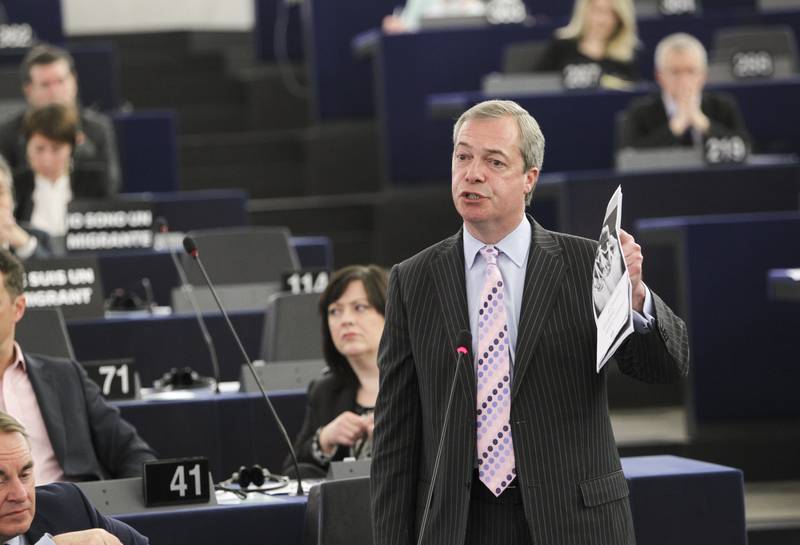 The Greens/European Free Alliance group also supported Mr Juncker. "Who are you afraid of, Mr Tusk?", asked the co-president of the group, Philippe Lamberts (Belgium). "So, I would ask you, please, to listen to Mr Juncker. He's one of yours. And encourage your colleagues to do the same", said the Belgian MEP. In the end of the debate, Commissioner Avramopoulos again recalled that on May 13 he would present the agenda for European migration and confirmed his position, expressed recently, that the Dublin regulation needed to be reformed. "For me it is an open issue and we will come back to it", he promised to the MEPs who were no longer listening to him, so the president had to ask for order.
The Greens/European Free Alliance group also supported Mr Juncker. "Who are you afraid of, Mr Tusk?", asked the co-president of the group, Philippe Lamberts (Belgium). "So, I would ask you, please, to listen to Mr Juncker. He's one of yours. And encourage your colleagues to do the same", said the Belgian MEP. In the end of the debate, Commissioner Avramopoulos again recalled that on May 13 he would present the agenda for European migration and confirmed his position, expressed recently, that the Dublin regulation needed to be reformed. "For me it is an open issue and we will come back to it", he promised to the MEPs who were no longer listening to him, so the president had to ask for order.
Later in the afternoon on Wednesday the MEPs voted on a resolution calling on the member states to create a binding quota for the relocation of asylum-seekers among all the member states. They also called on the member states to issue humanitarian visas and to make more generous contributions to the settlement programmes. The MEPs also urged the Common European Asylum Policy to be quickly and entirely transposed in national legislation and to be implemented. The resolution was supported by 449 votes "for", 130 were "against" and there were 93 abstentions. Among the abstentions were 41 MEPs from the EPP group. Surprisingly, the ECR voted against. Still, the resolution passed with a huge support from the EPP (158), S&D (175), ALDE (48), Greens/EFA (46), ECR (3), EFDD (18), according to VoteWatch.
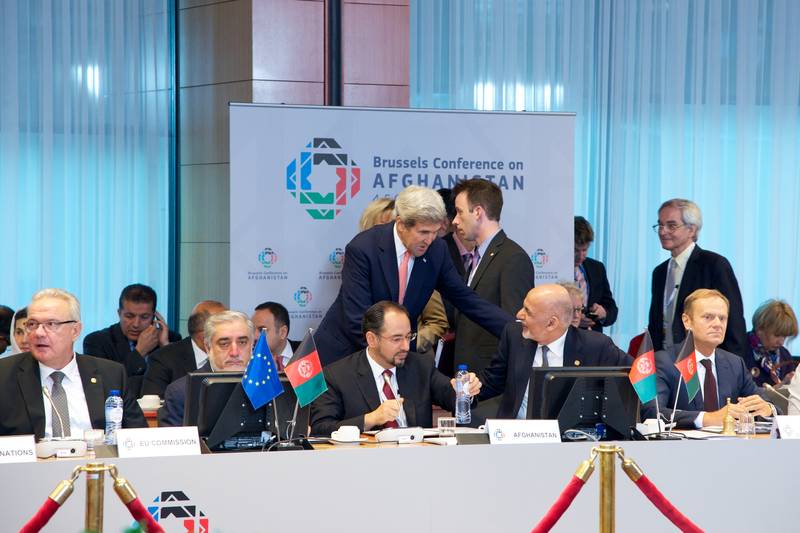 | © Council of the EU
| © Council of the EU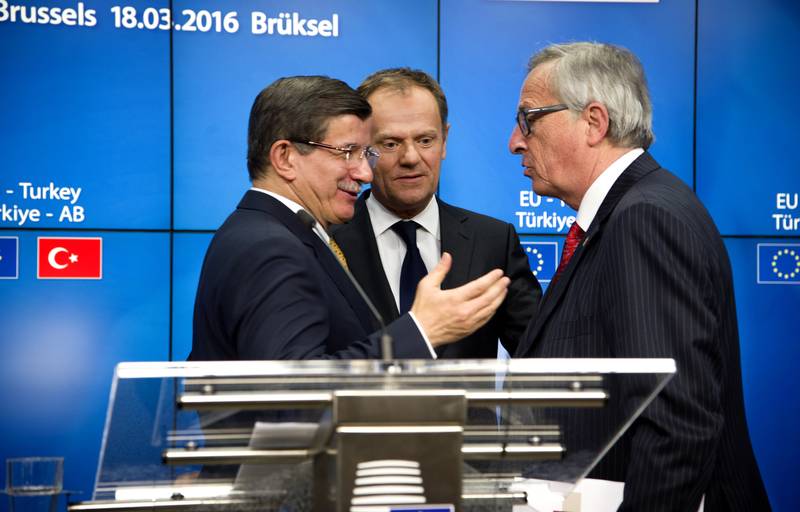 Davutoglu, Tusk, Juncker | © Council of the EU
Davutoglu, Tusk, Juncker | © Council of the EU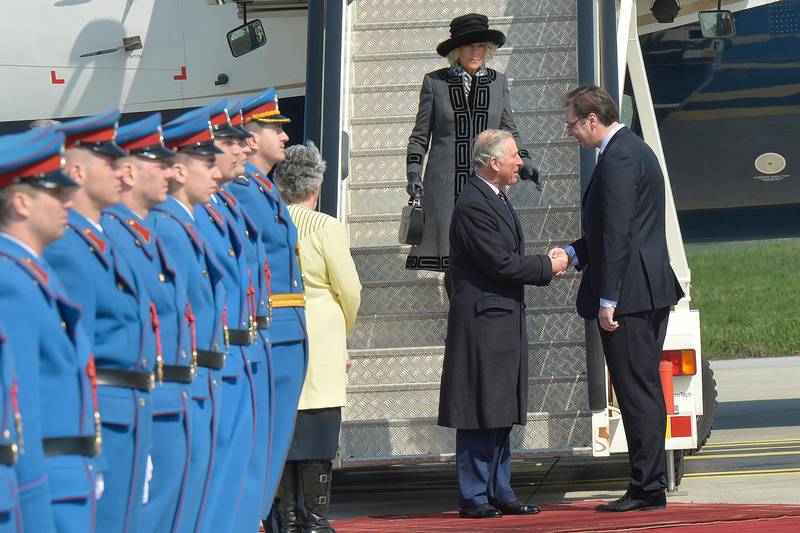 | © Vlada RS
| © Vlada RS